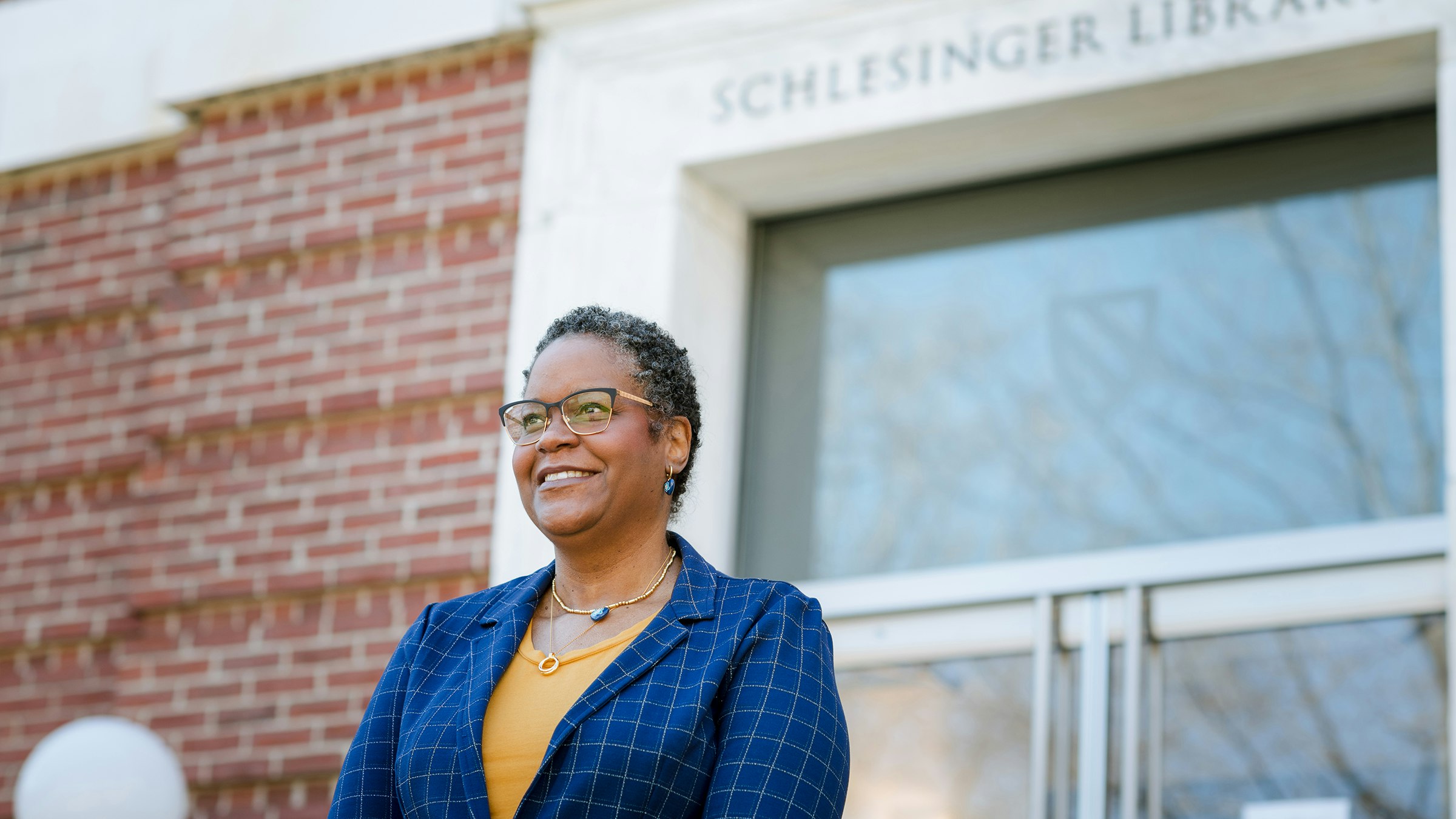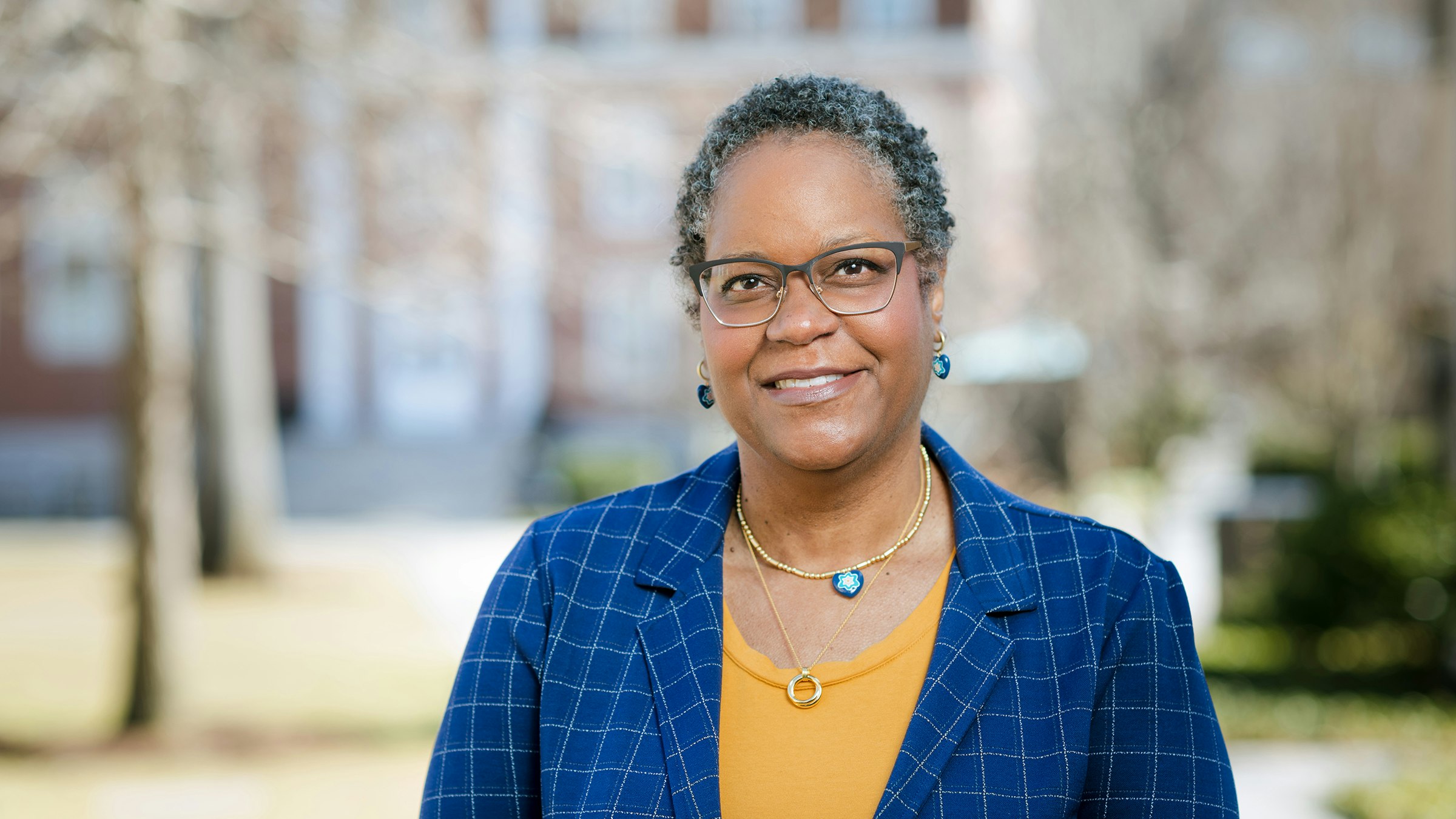The Library Welcomes a New Executive Director

A Q and A with Petrina D. Jackson
Petrina D. Jackson assumed her post as the Lia Gelin Poorvu Executive Director of the Schlesinger Library on November 1. “As a strong believer in an intellectually engaged library that is central to the life and learning of a university, I embrace the mission and work of the Schlesinger Library and Harvard Radcliffe Institute,” she said upon accepting the position.
Jackson is well poised to further the Library’s mission: She has a long track record of leadership at such organizations as the Special Collections Research Center at Syracuse University, the Special Collections and University Archives at Iowa State University, the Albert and Shirley Small Special Collections Library of the University of Virginia (where she also served on the president’s Commission on Slavery and the University, one of the first such efforts in the country), and the Division of Rare and Manuscript Collections at Cornell University. Jackson has also curated exhibitions and taught courses in ethics and in diversifying special collections and museums.
Outside of her official duties, she has been active in national professional organizations, serving on the Council of the Society of American Archivists, as chair of the American Library Association’s Rare Books and Manuscripts Section, and advising major grant-funded efforts on e-mail archiving and online cultural heritage resource development.
We asked Jackson about her background, her commitment to access, what special collections libraries have to offer various communities, and her hopes for the Library’s future.
Please tell us a little about yourself and your background.
I will share with you a little of what I shared with the Schlesinger Library Council. Personally speaking, I am an informed advocate, a dedicated listener, and a descendant of powerful women like my grandmother. Throughout my life, my grandmother shared with me her life in rural Georgia, marked by using plants and animals for home remedies, and going to school 30 minutes before or after the white children so they didn’t share the same road at the same time, or surviving when two sisters used Hoodoo to try to kill her when she was pregnant with my father. At that time, I didn’t know anything about archives, but these stories—hers and now mine—are my personal archive and have shaped me and my identity. They have influenced me to become an advocate for the stories that never get told.
What drew you to the Schlesinger?
I was recruited to the Schlesinger and frankly was elated at the opportunity. I care deeply about the history of marginalized people and being able to focus solely on women’s collections and especially of those who have been historically excluded is a joy for me. There are so many possibilities here to shine a bright light on these collections and share them with the Harvard community and broader public.
What do you hope to accomplish at our Library?
I plan to be a strong advocate for the Schlesinger staff and its collections, while making space for researchers, students, audiences, and event participants who have been excluded, felt separate from, or are completely unaware of our collections. I plan to invite people inside and outside of the Library, meaning I will be working on partnerships that not only bring people on campus but also show our presence off campus.
The Library has long worked to diversify its holdings so that they can tell a fuller, more historically accurate narrative. As I understand it, a big part of your work will be to support this. Can you please explain?
Be it diversifying the stories of exhibitions, collaborating with groups who have been excluded from the archives, or offering courses and programming whose content more accurately reflects all of the people who comprise American society, I plan to create pathways for these types activities. Diversity and inclusion represent strength.
Have you ever done anything like this before in your career? What are the known challenges, and are there many unknowns?
Yes, and often. One of these challenges occurred while I was head of Special Collections and University Archives at Iowa State University (ISU). The exhibition Activist Agriculture: Farm Protests in Iowa, 1929–1969, featured the Cow Wars of the 1930s and the activism of the National Farmers Organizations in the 1960s, which centered mostly on white farmers because ISU’s collections focused on white farmers. However, agriculture and farm life have always included marginalized groups. To show a more accurate narrative, I encouraged the curator to cover Iowa’s chapter of the League of United Latin American Citizens (LULAC) and its participation in the 1969 grape boycott. This required her borrowing facsimiles of LULAC materials from colleagues at the University of Iowa Libraries, which enabled ISU to include an important, more inclusive, and less heard of narrative of farm protests in Iowa.

Petrina Jackson has long worked to fill in the archival gaps of historically excluded populations and secure their legacies. Photo by Kevin Grady
You have a track record of collaborations that help connect new constituencies to special collections. Can you tell us about that?
This has been part of my work philosophy for as long as I have been an archivist. For example, as part of my effort to fill in the archival gaps of historically excluded populations and secure their legacies at Cornell, I worked with the Asian American Studies Program (AASP) to train its student workers to locate student and alumni materials. We also hosted an archives program for Asian/Asian American student organization representatives who were shown Rare and Manuscript Collections materials related to Asian and Asian American students. The program offered ways for AASP to assist the organizations in managing their records before depositing them into the University Archives.
In addition to being a special collections library, the Schlesinger is one of the few libraries at Harvard open to the public. Do you see further potential here for engagement, especially considering your and the Library’s role in telling a more complete history of America?
Certainly. Even though COVID has impacted our ability to have lots of people visit us in person, it is my hope that in the coming year that will ease. However, COVID has also shown us the positive impact of virtually sharing our collections and work. I see using a variety of tools, such as on-site exhibitions, Zoom webinars, classes, digital collections, etc., to engage with lots of different audiences and to show the many different stories that represent the Schlesinger Library.
What do special collections libraries like the Schlesinger have to offer communities, especially those who may have been previously underrepresented?
What’s important is partnering with underrepresented communities to see if and what they want from us. We can’t assume that we know what they want and need. It must be a true collaboration. We learn from them, and they learn from us.
Please tell us about growing up in Twinsburg, Ohio. Are you a twin?
First things first, I am not a twin. Growing up in Twinsburg was a pivotal time in my life, representing an identity collision course. I was 10 and moved from an all-Black suburb of Cleveland to a predominantly white, semirural community. Twinsburg launched me solidly into what W. E. B. DuBois named “double consciousness.” It was the first time in my life that I stopped moving in the world unconsciously. I was acutely aware of how people perceived me and how that impacted how they treated me. Although growing up in Twinsburg was challenging, I was an academic overachiever and learned how to navigate white spaces. This navigation has been essential to my development in the workforce and in life.







